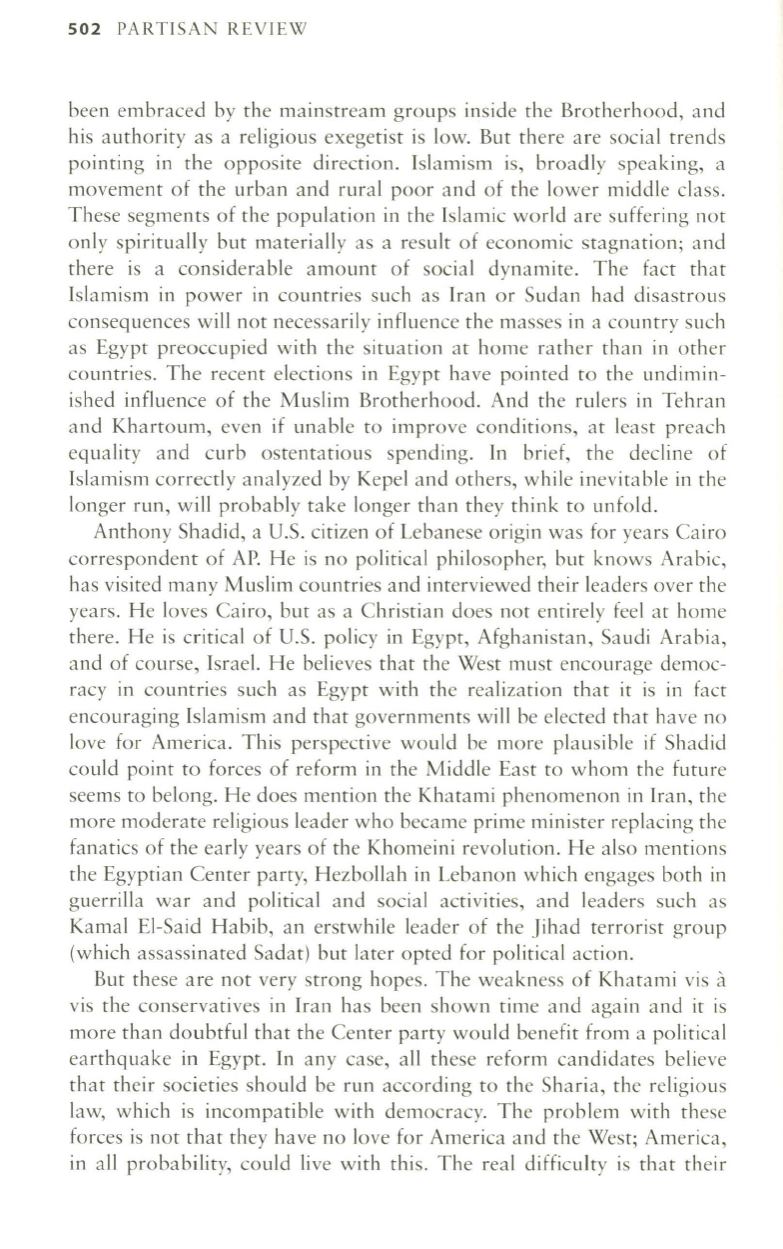
502
PARTISAN REVIEW
been embraced by the mainstream groups inside the Brotherhood, and
his authority as a religious exegetist is low. But there are social trends
pointing in the opposite direction. Islamism is, broadly speaking, a
movement of the urban and rural poor and of the lower middle class.
These segments of the population in the Islamic world are suffering not
only spiritually but materially as a result of economic stagnation; and
there is a considerable amount of social dynamite. The fact that
Islamism in power in countries such as Iran or Sudan had disastrous
consequences will not necessarily influence the masses in a country such
as Egypt preoccupied with the situation at home rather than in other
countries. The recent elections in Egypt have pointed
to
the undimin–
ished influence of the Muslim Brotherhood. And the rulers in Tehran
and Khartoum, even if unable
to
improve conditions, at least preach
equality and curb ostentatious spending. In brief, the decline of
Islamism correctly analyzed by Kepel and others, while inevitable in the
longer run, will probably take longer than they think
to
unfold.
Anthony Shadid, a U.S. citizen of Lebanese origin was for years Cairo
correspondent of AP. He is no political philosopher, but knows Arabic,
has visited many Muslim countries and interviewed their leaders over the
years. He loves Cairo, but as a Christian does not entirely feel at home
there. He is critical of U.S. policy in Egypt, Afghanistan, Saudi Arabia,
and of course, Israel. He believes that the West must encourage democ–
racy in countries such as Egypt with the realization that it is in fact
encouraging Islamism and that governments will be elected that have no
love for America. This perspective would be more plausible if Shadid
could point
to
forces of reform in the Middle East
to
whom the future
seems
to
belong. He does mention the Khatami phenomenon in Iran, the
more moderate religious leader who became prime minister replacing the
fanatics of the early years of the Khomeini revolution. He also mentions
the Egyptian Center party, Hezbollah in Lebanon which engages both in
guerrilla war and political and social activities, and leaders such as
Kamal EI-Said Habib, an erstwhile leader of the Jihad terrorist group
(which assassinated Sadat) but later opted for political action.
But these are not very strong hopes. The weakness of Khatami vis
a
vis the conservatives in Iran has been shown time and again and it is
more than doubtful that the Center party would benefit from a political
earthquake in Egypt. In any case, all these reform candidates believe
that their societies should be run according
to
the Sharia, the religious
law, which is incompatible with democracy. The problem with these
forces is not that they have no love for America and the West; America,
in all probability, could live with this. The real difficulty is that their


